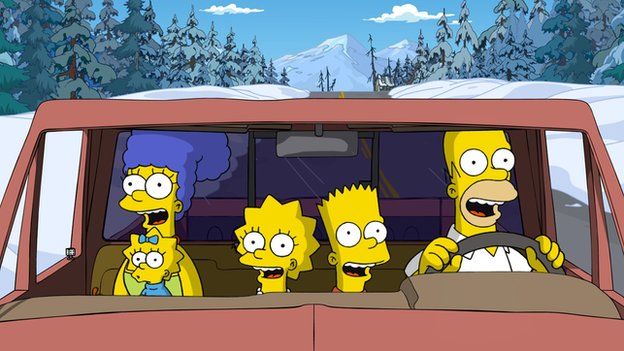What sitcoms say about American voters
- Published

If all you saw of America was what you see on the news, you'd think it was an incredibly angry and divided country. The presidential election offers a stark choice between two different philosophies of government, and the polls suggest that the country is torn down the middle over which one is correct.
But there's also plenty to be learned from America's comedy output. Written to attract as many people as possible, US sitcoms don't just succeed by being funny but also by being real. As a result, they do a good job of capturing the true complexity of people's opinions.
On cultural issues, for example, they show that much has changed in the last 10 years. But some traditions and values remain that are as American as apple pie.
In terms of change, one of the most startling developments is the growth in the number of sitcom gay characters and their acceptability to the viewing public.
Modern Family is a mega-hit comedy that features three families - a white couple with 2.4 kids, an interracial marriage between a white man and a Hispanic woman, and a gay couple who are raising an adopted daughter.
The show isn't about politically correct cliches. In one episode, the gay couple - Cameron and Mitchell - want to get their toddler into a popular school. Worried that their sexuality isn't enough to win over the ultra-liberal headmaster, Cameron pretends to be a Native American. His improvised "injun" accent is met with a stony silence and the daughter doesn't get her place.
Given that it explores race and sexuality with such frankness, we might expect Modern Family to be something that mostly Democrats watch. In fact, both Obama and Romney have cited it as their favourite show and Republicans in general are more likely to watch it than Democrats.
Why? It might be because Modern Family reflects the changing status of gay and lesbian people in American society. Four in 10 Americans tell pollsters that they have a gay friend or relative and one in four gay couples are now raising a child. Gays and lesbians are increasingly more visible and accepted.
Likewise, Modern Family's inter-racial marriage touches upon developments in race relations. By 2040, America will no longer be a majority-white country, with the fastest growth rate among Hispanics. Of course, racial discrimination still exists and tensions flare. But integration is slowly happening. Today, one in seven marriages is interracial.
While US sitcoms have caught the more liberal attitudes to gays and lesbians, on other issues they've reflected a different movement in public opinion. Abortion is an issue that tears America apart - with roughly half the country passionately opposed to it and half in favour. TV producers don't like those odds.
Cartoon sitcom Family Guy featured an abortion episode but the network refused to run it. Family Guy's mistake was to make an entire episode about abortion that satirised its opponents. But another cartoon sitcom, South Park, has repeatedly dealt with the subject without apparently taking sides. It articulates the visceral discomfort many Americans feel about abortions.
Embracing the "new" doesn't mean Americans have to throw out the "old" altogether. The USA remains a remarkably religious society - a place where 80% say they believe in God and nearly half regularly attend a place of worship. Again, we can find evidence for this in the sitcoms. In the fictional universe of The Simpsons, God is very real and often makes special guest appearances.
In one episode, he scolds Homer - the slobbish main character - for refusing to go to church. God isn't the only one who is furious with his decision to spend Sundays eating waffles and watching TV. Marge, his long-suffering wife, lays out this ultimatum: "Homer, please don't make me choose between my man and my God. Because you just can't win." It's an extraordinary statement of faith - Marge seems to be threatening to leave the man she loves if he won't go to church with her.
But it makes sense in a country where church isn't just a social ritual but part of a vibrant spirituality that can both unite and divide. By not going to church, it is implied, Homer rejects his family as well as his faith.
What the sitcoms capture is how the private lives of ordinary American blend liberal and conservative cultural attitudes. Politicians try to turn culture into a battleground between Left and Right, hoping to exploit it at the ballot box. But this kind of pigeon-holing can't accurately reflect or control the way that popular culture has evolved.
For most voters, the biggest issue in 2012 isn't how to keep up with social change but instead how to keep afloat during an economic downturn.
After the "credit crunch", the equivalent of an entire generation's wealth was lost. The sitcoms have touched upon the new anxieties. ABC's The Middle features a middle-aged couple raising three kids in middle-America, on a middle-income.
In one episode, the husband loses his job and the family have to downgrade their lifestyle. They go shopping in a budget supermarket that advertises, "Slightly Off Veal" and "Ronald Reagan Inaugural Jellybeans".
When one of the kids asks if this means the family is now officially poor, the mum says, "No … we're just trying something new called living within our means." Horrified, the teenaged boy replies, "You mean we've been living outside our means?! Oh, God…"
After a century of fantastic wealth, that's what Americans have to come to terms with doing.
Tim Stanley presents Family Guys: What Sitcoms Say About America Now on BBC Two, 27 October, 22:00 GMT
Picture credits: The Simpsons: 20th Century Fox/Everett/Rex Features. Family Guy: 20th Century Fox. Modern Family: ABC Inc/Everett/Rex Features. The Middle: ABC Inc/Everett/Rex Features.